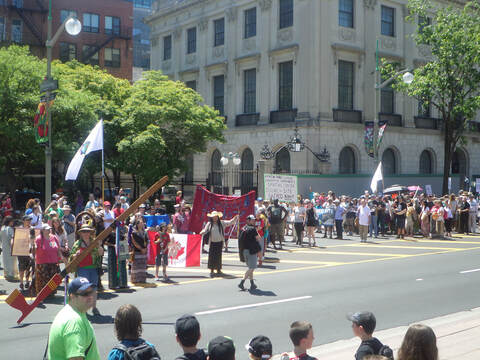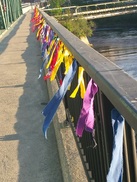|
7/7/2016 4 Comments On Empowering Settler Allies … Sacred Walk Ottawa, June 17, 2016. Photo use with permission Matt Cicero Sacred Walk Ottawa, June 17, 2016. Photo use with permission Matt Cicero 1. The land claims process is an industry for lawyers and a job creation program for a few Algonquin people and nothing more. 2. Canada has huge amounts of money to craft policy and legislation that will forever prevent the Algonquin from unifying. The argument that the Algonquin must first come together before settlers act is incredibly misinformed and not at all rational. 3. Canada, like all oppressors, intentionally obfuscates and confounds things. Through this process oppressors gain agency in their oppressive acts. Do not fall for this. 4. Including oppressors, such as the police in your effort will thwart momentum. Make no mistake, it will. While at some point they may have a role in the final acceptance of structural change, this is near the end of the journey, not at the beginning.  Prayer Ribbons Prayer Ribbons 5. Elders are ONLY one element of community governance traditions. It is community members – who have watched the child be socialized and shaped, grow up, and be valued as a person with good moral standing and integrity – who know who the genuine Elders are. Settler people need to stop interfering with identifying and calling people Elders. You do not have an Elder as in “my Elder”. If you want Indigenous people to get our act together, settlers must stay out of our traditions. Alternatively stated, Elderism has to end. For the most part Elders are for ceremony. 6. While sometimes an Elder is also an Intellectual, settlers need to understand that Indigenous communities also have philosophers and intellectuals. It will be the intellectuals that put concrete discourse to the policies and legislations that will motivate people and generate momentum. This is not a devaluation of Elders; it is an appreciation that Indigenous knowledge is also in the intellectuals. Alternatively stated, Elderism has to end. 7. All people are Indigenous to Mother Earth. Do not let oppressed Indigenous people who are laden with internalized oppression and lateral violence take this away. Settler people can, and must, stand up in a good kind way and defend their right to clean air, water, and land. We all have this responsibility. 8. Genuine action is not a festival, nor is it a tourist attraction, or a photographer’s / videographer’s opportunity. It is real hard work and some of us have been working on Indigenous rights for over 250 years. Yes, that is what I wrote, 250 years.  Chaudière Falls courtesy Lindsay Lambert Chaudière Falls courtesy Lindsay Lambert 9. Knowledge is not in the majority and not held in consensus. Sometimes the most important knowledge is in the one person or the minority. We must listen to all the voices paying attention to experiential knowledge, intellectual knowledge, and the person’s critical training to determine if hegemonic forces have placed the knowledge in the minority. Alternatively stated, stop allowing the tyranny of the majority and the need for a consensus thwart people’s needs. Always think critically; move away from criticizing. 10. Settlers need to act strategically and think about who they are creating space for. Local Indigenous people and their intellectuals need to be central, and an effort must be made to include them at all levels such as who speaks when and for how long, who is the master of ceremonies, who are the advisers, and who are the helpers … . 11. Know that oftentimes the most important knowledge is not flattering nor will it be candy-coated. In the context of structural oppression knowledge can and will be angry, frustrated, and depressed. If all you listen to is happy knowledge you are making a grave mistake. Generally speaking it is a good thing to look out for “nice” people as they very likely are manipulating you for personal gain. Listen to authentic people. As an example, if you do not like the knowledge in this blog, this in itself does not make it wrong. Learn to be more objective. 12. The argument that the best speakers are free is completely incorrect. Find speakers with the knowledge and support their hard work, time, thinking, and ideas. If what you want is genuine change, this Truth is a no-brainer. More ally resources are posted here. Please like and share this blog. Lynn Gehl, Ph.D. is an Algonquin Anishinaabe-kwe from the Ottawa River Valley. She has a section 15 Charter challenge regarding the continued sex discrimination in The Indian Act, and is an outspoken critic of the land claims process. Her book The Truth that Wampum Tells: My Debwewin of the Algonquin Land Claims Process offers an insider-Indigenous analysis of the Algonquin land claims process in Ontario. You can reach her through, and see more of her work at www.lynngehl.com.
4 Comments
Cathy
7/8/2016 05:13:29 am
Wow Lynn,
Reply
7/8/2016 07:16:03 am
Thank you for putting this out here Lynn. It is important that we try to think from ourselves, for the commons.
Reply
7/11/2016 10:06:22 pm
Lynn you have made some very thought-provoking and mindful comments. As a settler and a Canadian--I live in Secwepemc Nation, or Tsq'escen' Territory / BC I was raised from childhood to be very aware of my personal privilege and at age 63 am more aware than ever. It is my intention to run for elected office in the BC gov't in 2017; a big incentive for this is that I live in the area that is the subject of the Canadian Supreme Court decision for Chilcotin Nation. This is a decision by which, by its own laws, the very existence of Canada is rendered invalid. As such, I believe it potentially forms the greatest decolonizing tool possible--if it is wielded. Of course it is in the BC gov't interest to make sure it never does get wielded---hence my incentive to be part of that body--not as the status quo but as a radical disruptor. It will be as a Green, since the conventional parties are too thoroughly owned to be of any help. Your thoughts on being an ally are therefore something I can take on board.
Reply
Deb Brown
7/12/2016 08:15:51 am
great blog Lynn. :)
Reply
Your comment will be posted after it is approved.
Leave a Reply. |
|
To subscribe to Lynn's Blog: click here
To subscribe to Lynn's Newsletter: click here To follow Lynn on her Public Facebook Page: click here To subscribe to Lynn's YouTube channel: click here To book Lynn as a speaker: click here To contact Lynn/License her work: click here Copyright Dr. Lynn Gehl, 2024 All Rights Reserved
|
 RSS Feed
RSS Feed
